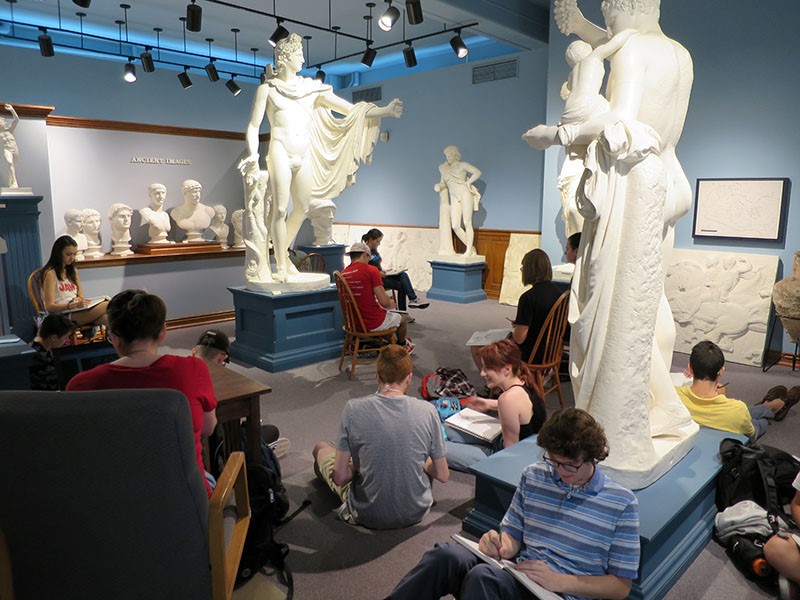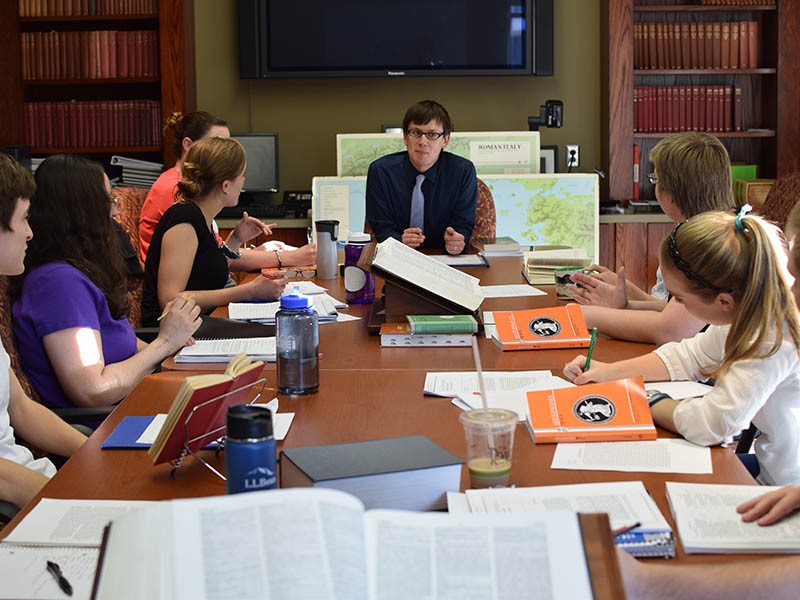Latin
Why Latin?
 Videbo visionem hanc magnam quare non comburatur rubus.
Videbo visionem hanc magnam quare non comburatur rubus.
"I will see this great sight – why the bush is not burnt." (Motto of the University of Kansas)
Latin is the language of Ancient Rome (Youtube), an Italian city state that expanded to control a vast territory (Wikipedia), stretching through Europe, Asia, and North Africa at its furthest reach in the early 2nd century CE. It is the language of the emperors, the politicians, and the revolutionaries of that state – of Augustus (BBC), of Cicero (NatGeo), of Caesar (Wikipedia). It is also the language of Roman literature: the comedies (Youtube) of Plautus and Terence; the epic poetry of Virgil (Youtube); and the love elegy of Propertius (offsite). Later, Latin would become the shared language of literature and learning in those areas that had been touched by the Roman empire and its descendants. It is the language of early Christian thinkers, such as Augustine (Wikipedia) and Aquinas (Wikipedia), and of the contemporary Catholic church. It is the language of Renaissance poetry (e.g. Petrarch (offsite) and Dante (offsite)); of the scientific revolution (e.g. Newton (Wikipedia) and Galileo (Wikipedia)); and of early modern statecraft (e.g. Hobbes (offsite) and More). Today, in the USA, it is still the language of common proverbs (“carpe diem!”), of public mottos (“ad astra per aspera”), and of the legal system (“pro bono”).
By choosing to take Latin at KU, you will have access to a vast wealth of literature and human experience across multiple continents and more than two millennia. You will be able to read famous texts that have left an indelible mark on modern culture, such as Ovid’s Metamorphoses (Wikipedia) and Tacitus’ Annals (Wikipedia). You will also be able to read the writings left behind by ordinary people, be they notes left in a military camp (offsite), biographies inscribed on tomb stones (offsite), or curse tablets thrown into graves (offsite). Learning Latin offers you to opportunity to come face-to-face with a different culture and to discover the everyday lives of the men and women of the Roman world.
As well as allowing you to read the wide array of texts written in the language and to experience the life and culture of ancient Rome, studying Latin can also help you to understand contemporary scientific and legal vocabulary, as well as laying the foundations for future language learning in related languages such as French, Italian, Spanish, and Portuguese. A large amount of English scientific and legal vocabulary comes straight from Latin (e.g. homo sapiens = homo “human” + sapiens “wise”; subpoena = sub “under” + poena “penalty”). By learning the Latin building blocks of terms, you can understand the meanings of new technical terms even if you’ve never seen them before! Learning Latin also provides a huge head start if you hope to learn any Romance languages in the future. Romance languages such as French, Italian, and Spanish all evolved from Latin, so they share many of the same grammatical features and have Latin vocabulary at their roots.
Image: The Seal of the University of Kansas
Latin at KU
 Latin (LAT) is offered at all levels by the Department of Classics. If you’ve never taken the language before, this is a perfect place to start! If you’ve already taken some Latin in high school, we offer a full range of intermediate and advanced courses which will allow you to consolidate your language skills and read a wide variety of Latin texts. We also offer retroactive college-level credit for students who have taken two or more years of Latin at high school and complete a Latin course at KU.
Latin (LAT) is offered at all levels by the Department of Classics. If you’ve never taken the language before, this is a perfect place to start! If you’ve already taken some Latin in high school, we offer a full range of intermediate and advanced courses which will allow you to consolidate your language skills and read a wide variety of Latin texts. We also offer retroactive college-level credit for students who have taken two or more years of Latin at high school and complete a Latin course at KU.
In addition to our comprehensive Latin language program, the Department of Classics also runs Classics (CLSX) courses in translation on the literature, history, and archaeology of Ancient Rome– for example “CLSX 148 Greek and Roman Mythology” and “CLSX 151 Introduction to Classical Archaeology.” We also have a thriving MA program offering advanced course work in the languages and cultures of ancient Greece and Rome. The Department also runs the Wilcox Classical Museum, where you can find original artifacts from the ancient world as well as reproductions of some of the most famous works of Roman art. The wide range of courses and resources available at KU offer a unique opportunity to gain a full understanding of the language, literature, and culture of an ancient civilization. For more detailed information, please refer to the Classics Department's website.
Image: KU students at the Wilcox Classical Museum
Courses Offered and Degree Paths
Our Latin courses represent a comprehensive language program, from beginner to graduate level. If you have not studied Latin before, the best place to start is by enrolling in our beginners’ course, LAT 104/105 Elementary Latin I. This course is the first part of a two-semester introduction to Latin grammar and its core vocabulary, which is completed by taking LAT 108/9. The introductory sequence provides the language skills and reading practice you will need to join the intermediate course, LAT 112/3, where you will read selections from authors such as Cicero, Caesar, and Catullus in the original language.
If you have studied Latin before and would like to continue to learn more about the language and literature of Ancient Rome, please contact Prof. Craig Jendza for advice on placement.
Courses in Latin contribute towards the Department of Classics’ degrees in Classical Languages and Classical Antiquity, as well as towards obtaining a minor in either of these fields.
Always check the KU Course Catalog for most up-to-date listings.
Resources
 For more information about opportunities to learn about the Latin language and Roman culture at KU, please consult the following:
For more information about opportunities to learn about the Latin language and Roman culture at KU, please consult the following:
- Retroactive Credit Policy
- Wilcox Classical Museum
- KU Classics Department (Facebook)
- KU Classics Department (Twitter)
- KU Classics Club
Image: A Greek language class at KU
For additional information and inquiries, please contact:
